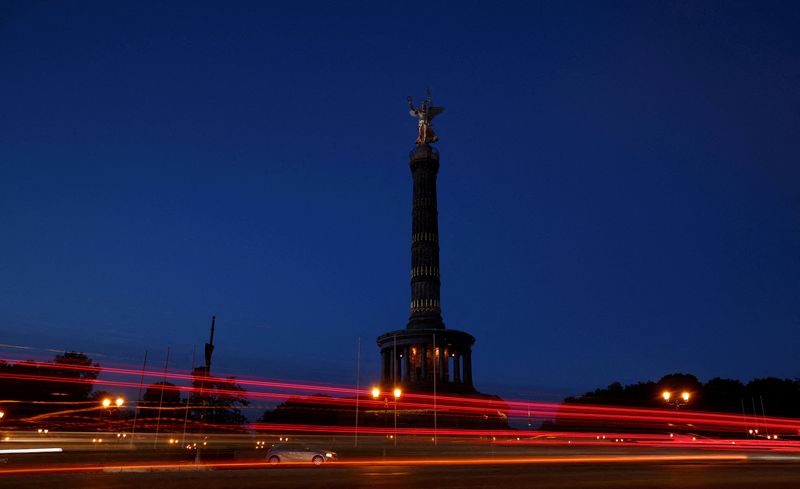
© Reuters. FILE PHOTO: Cars make their way past the Victory Column shows a reduced lighting to save energy due to Russia’s invasion of Ukraine in Berlin, Germany August 6, 2022. REUTERS/Lisi Niesner/File Photo
By Miranda Murray and Maria Martinez BERLIN (Reuters) – German economic output stagnated in the final quarter of 2022 and grew 1.9% over the full year, data showed on Friday, adding to signs that Europe’s largest economy may – at least over the winter – dodge a recession. The full-year rise in gross domestic product (GDP) just beat the mid-range forecast of 1.8% in a Reuters poll of economists. GDP in 2022 was 0.7% higher than in 2019, the year before the start of the COVID-19 pandemic. “The economic slowdown over the winter half-year will, according to the data we have now, be milder and shorter than expected,” Economy Minister Robert Habeck said in the ministry’s monthly report. Thomas Gitzel, chief economist at VP Bank, said the economy had outperformed low expectations, adding: “It is possible that the recession will be postponed. On the other hand, we think it is unlikely that the recession will not materialise at all.” A recession is commonly defined as two successive quarters of contraction, and the Federal Statistics Office’s fourth quarter figure of zero growth was an initial readout that might yet be revised. But there have been growing signs that the economy, which grew in the third quarter, could stave off the worst of a downturn triggered by a plunge in energy supply from Russia after its invasion of Ukraine. Despite that backdrop, which has fuelled inflation, German business morale rose more than expected in December, a survey showed last month. In Britain, where the broader economic outlook for 2023 remains gloomy, data on Friday showing modest growth in November suggested it may have avoided already slipping into recession. German government economic adviser Monika Schnitzer on Thursday told Reuters that domestic inflation had probably peaked as global energy prices have fallen, adding that she expected prices to continue to fall this year.
Inflation eased for a second month in a row in December due to falling energy prices and a one-off government off payment of household energy bills, with EU-harmonized consumer prices rising 9.6% on the year. Germany’s state deficit was 2.6% of GDP in 2022, the Statistics Office added.
